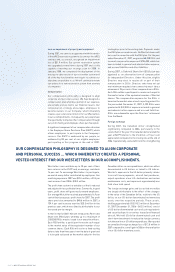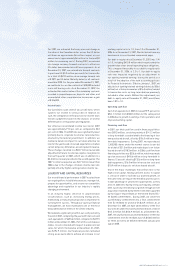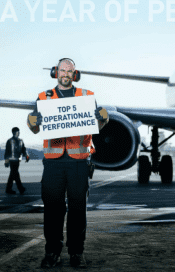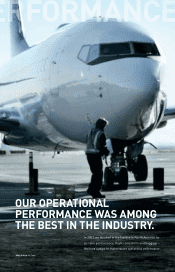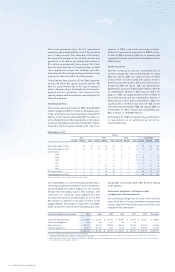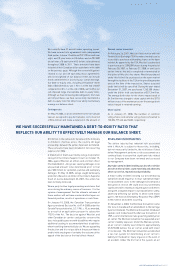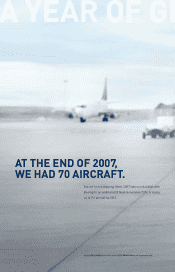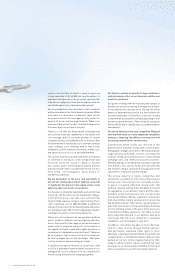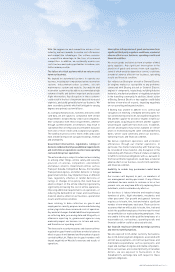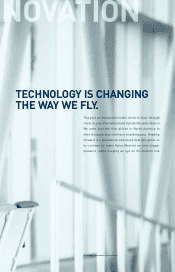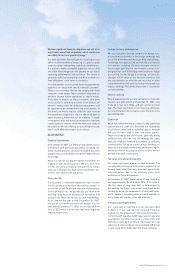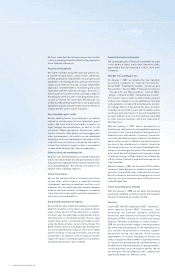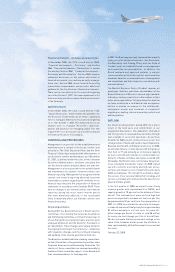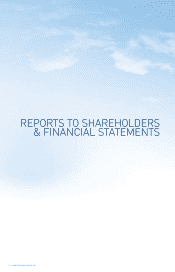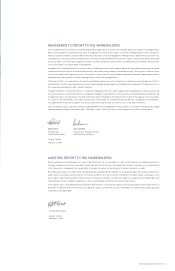Westjet 2007 Annual Report Download - page 33
Download and view the complete annual report
Please find page 33 of the 2007 Westjet annual report below. You can navigate through the pages in the report by either clicking on the pages listed below, or by using the keyword search tool below to find specific information within the annual report.
WESTJET ANNUAL REPORT 2007 PAGE 31
With the aggressive and competitive nature of our
industry, we turn inwards to realize cost effi ciencies
and competitive advantages. Our culture remains
a competitive advantage in the face of increased
competition. In addition, we continually monitor our
cost structure and seek opportunities to reduce costs
further where possible.
The failure of critical systems which we rely on could
harm our business.
We depend on automated systems to operate our
business, including our computerized airline reservation
system, telecommunication systems, aircraft
maintenance system and website. Our website and
reservation system must be able to accommodate a high
volume of traffi c and deliver important and accurate
fl ight information. Any disruption in these systems
could result in the loss of important data and increased
expenses, and could generally harm our business. We
have secondary systems which will mitigate to varying
degrees any primary system failures.
As a company that processes, transmits and stores credit
card data, we are subject to compliance with certain
requirements established by credit card companies.
Non-compliance with these requirements, whether
through system breaches or limitations, may result in
substantial fi nes or temporary or permanent exclusion
from one or more credit card acceptance programs.
The inability to process one or more credit cards could
have a material impact on our guest bookings, revenue
and profi tability.
Government intervention, regulations, rulings or
decisions rendered that impose additional requirements
and restrictions on operations could increase operating
costs and disrupt our operations.
The airline industry is subject to extensive laws relating
to, among other things, airline safety and security,
provision of services, competition, environment
and labour concerns. Government entities such as
Transport Canada, Competition Bureau, the Canadian
Transportation Agency, and other domestic or foreign
government entities may implement new or different
laws, regulatory schemes or render decisions or
rulings, or changes in tax policy, that could have an
adverse impact on the airline industry in general by
signifi cantly increasing the cost of airline operations,
imposing additional requirements on operations, or
reducing the demand for air travel, and could have a
material adverse effect on our business, operational
results and fi nancial condition.
Laws relating to data collection on guests and
employees for security purposes and counterbalancing
privacy legislation have increased costs of operation.
Any material changes that add additional requirements
on collecting data, processing data and fi ling with, or
otherwise reporting to, government agencies may
materially impact our business as to time and costs,
and therefore our operating results.
The increase in security measures and clearance times
required for guest travel could have a material adverse
effect on guest travel demand and the number of guests
carried by WestJet. Reduction in guest numbers will
impact negatively on WestJet’s revenues and results of
operations.
Interruption in the provision of goods and services from
signifi cant third party suppliers could have a material
adverse affect on our business, operating results and
fi nancial condition.
We secure goods and services from a number of third
party suppliers. Any signifi cant interruption in the
provision of goods and services from such suppliers,
some of which would be beyond our control, could have
a material adverse affect on our business, operating
results and fi nancial condition.
Our reliance on Boeing for aircraft or General Electric
for engines makes us susceptible to any problems
connected with Boeing aircraft or General Electric
engines or components, respectively, including defective
materials, mechanical problems or negative perception
in the travelling community. In addition, labour action
at Boeing, General Electric or key suppliers could delay
delivery of new aircraft or parts, impacting negatively
on our operating and expansion plans.
If Boeing was unable to adhere to its contractual
obligations in meeting scheduled delivery dates for
our owned and leased aircraft, we would be required to
fi nd another supplier for aircraft or engines to fulfi ll our
growth plans. Acquiring aircraft from another supplier
would require signifi cant transition costs. In addition,
aircraft and engines may not be available at similar
prices or received during the same scheduled delivery
dates, which could adversely affect our business,
operating results and fi nancial condition.
We derive significant operations and utilization
efficiencies through our charter operations. In
particular, the charter relationship with Transat may
be considered to be material. Any disruption in the
relationship with Transat or Transat’s failure or inability
to fulfi ll its contractual obligations with us, pursuant to
the Transat Charter Agreement, could have a material
adverse effect on our business, results from operations
and fi nancial condition.
Inability to retain key personnel could harm
our business.
Our success will depend, in part, on members of
our management and key personnel. If any of these
individuals become unable to continue in his or her
present role, we may have diffi culty replacing these
individuals, which could adversely affect us.
Our business is labour intensive and requires large
numbers of pilots, fl ight attendants, mechanics and
other personnel. Our growth and general turnover
requires us to locate, hire, train and retain a signifi cant
number of new employees each year. There can be no
assurance that we will be able to locate, hire, train and
retain the qualifi ed employees that we need to meet
our growth plans or replace departing employees. If we
are unable to hire and retain qualifi ed employees at a
reasonable cost, our business, operating results and
fi nancial condition could be adversely affected.
Our fi nancial results are affected by foreign currency
and interest rate fl uctuations.
We are exposed to US-dollar currency fl uctuations
due to US-dollar payment obligations associated with
aircraft lease payments, aircraft fuel purchases and
maintenance expenditures such as spare parts, and
repair and overhaul of engines and rotable components.
Since our revenues are received primarily in Canadian
dollars, we are exposed to fluctuations in the
Canadian/U.S. exchange rate with respect to these
payment obligations.



